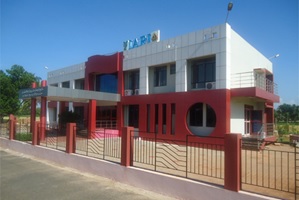भा.कृ.अ.प. - भारतीय कृषि अनुसंधान संस्थान | ICAR-Indian Agricultural Research Institute
| English | || || |
भा.कृ.अ.प. - भारतीय कृषि अनुसंधान संस्थान | ICAR-Indian Agricultural Research Institute
| English | || || |

Rice Breeding and Genetics Research Centre (RBGRC) of Indian Agricultural Research Institute (IARI) is located inside the campus of Tamil Nadu Rice Research Institute (TRRI) at Aduthurai. Located in the Cauvery delta zone of Thanjavur district, Tamil Nadu lying between 11°00’ N and 79° 28’E at 19.5m above mean sea level, the Centre enjoys weather conditions that favor rice cultivation throughout the year. With an average annual rainfall of 1150 – 1250 mm mainly received during northeast monsoon, and fed round the year by the perennial Cauvery River that brings water from southwest monsoon catchments, Cauvery delta is a fertile rice growing region of the Peninsular India, where traditional rice cultivation dates back to more than two millennia.
Genesis
Established in 1968 by Dr. M. S. Swaminathan, then Director of IARI to facilitate accelerated rice breeding programme of the institute, the Centre contributed immensely to the early success of green revolution in rice through the development of popular Pusa rice varieties. Coinciding the rabi season during which rice cultivation is not practiced in Northern India, the Centre offered a rapid generation advancement ‘off-season’ shuttle platform for the breeding materials developed at New Delhi. Besides, long-duration photosensitive rice varieties that do not flower at New Delhi conditions could be grown easily at Aduthurai. Although in the initial years, the Centre was functional as a breeding material shuttle system between IARI and Rice Research Station at Aduthurai, a permanent rice breeding center was established during 1981 under the Division of Genetics - a move that recognized the tangible role of shuttle breeding program in the years to come. The Centre is now equipped with laboratories for rice grain quality analysis and molecular breeding and works towards development of thermo-sensitive male sterility based rice hybrids and nutrient efficient rice varieties.
Rice Breeding and Genetics Research Centre at Aduthurai has a unique opportunity of being served by several eminent rice scientists of the country including two Padma Shree awardees, Dr EA Siddiq and Dr VP Singh.
A unique shuttle breeding center for rice
A few years into the off-season breeding at Aduthurai, IARI rice breeders quickly recognized the versatility of the Centre to start the world’s first rice shuttle breeding programme, a methodology adopted by Dr. Norman E. Borlaug in wheat during early 1960s. This new method could leverage rice improvement for combining high yield with high quality attributes such as appealing aroma and cooking attributes, fluffiness, palatability and easy digestibility. Further, use of photosensitive varieties in new lineages was possible in Aduthurai conditions. Having geographically separated for about 2000 km, the agroclimate of New Delhi is humid subtropical and that of Aduthurai is tropical wet-dry. Besides, both the locations have distinct photoperiod regimes. Thus continuous and alternate generation selections of the same breeding materials at both the locations resulted in more stable genotypes combining wider adaptation and resistance to pests and diseases.
Besides Aduthuari and Delhi, Karnal station was integrated into the rice shuttling loop for maintenance breeding. Thus the rice breeding programme within the loop grew into a successful shuttle programme that linked pre-breeding, development and selection of varieties and maintenance and seed production at marketable levels, completing the whole rice breeding cycle in a refined integration of exemplary nature. It is for this approach the IARI rice breeding programme has been lauded as one of the best ever rice breeding programme in the world by eminent rice experts. Because of this reason, IARI’s rice shuttle breeding programme became more advanced than the acclaimed wheat shuttle breeding system of CIMMYT which operates between Ciadad Obrogon and Toluca in Mexico. In the CIMMYT’s programme wheat crop could be grown only in one season at both locations, whereas in the IARI’s shuttle breeding system round the year breeding option was available, with Aduthurai supporting three cropping seasons within
